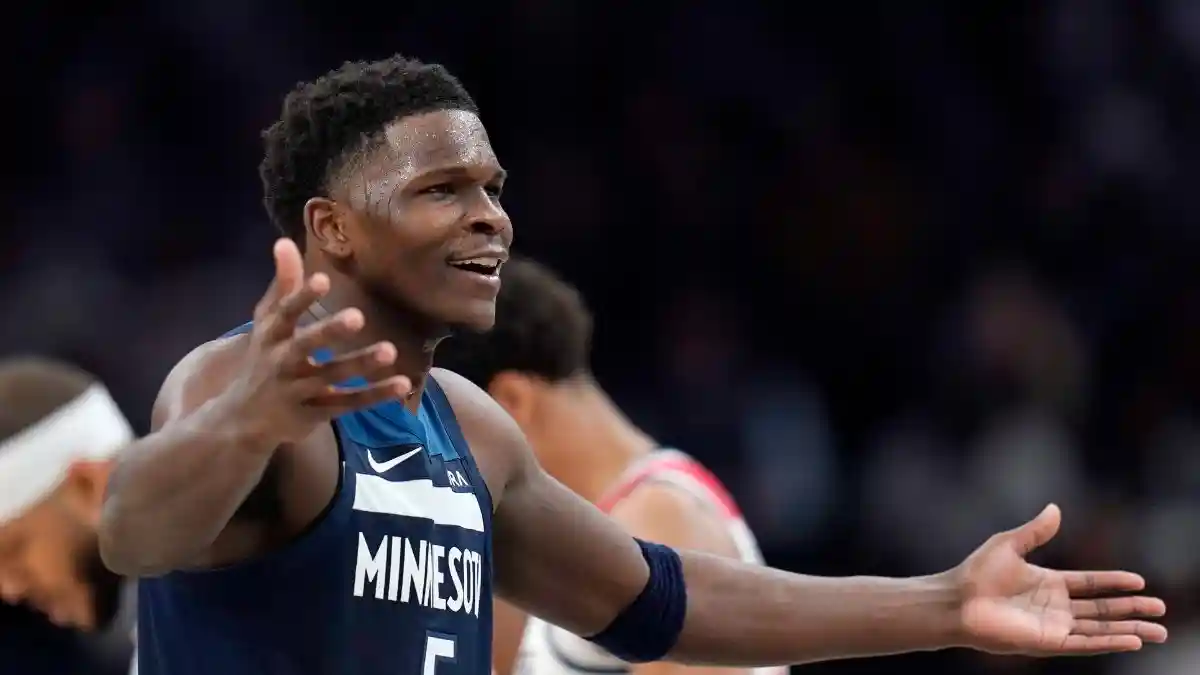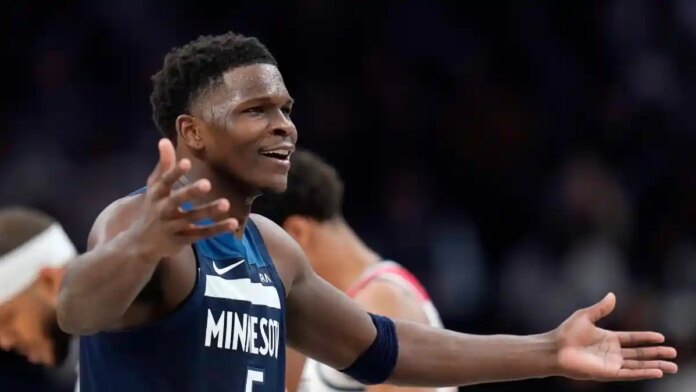The Minnesota Timberwolves’ pursuit of their first NBA Finals appearance ended in familiar heartbreak. For the second straight year, the franchise reached the doorstep of the NBA’s biggest stage only to be turned away—this time in a 124–94 Game 5 blowout against the top-seeded Oklahoma City Thunder. As confetti rained down in Paycom Center, Anthony Edwards stood in front of reporters and looked ahead.

“I’m going to work my butt off this summer,” Edwards said, promising to respond to the playoff defeat with relentless offseason preparation. “Nobody’s going to work harder than me this summer. I’ll tell you that much.”
It was a sharp contrast to the emotions seen across the Timberwolves locker room. Edwards had shouldered heavy expectations all postseason, and after averaging 27.6 points in the regular season, he was held below 20 points in three of the five games in the Western Conference Finals. In Game 5, he finished with 19 points on 7-of-18 shooting (1-of-7 from three), turned the ball over three times, and Minnesota was outscored by 29 points in his 39 minutes on the court.
“They were the better team. They came out and beat us, punched us in the face,” Edwards said. “And we lost the game, we lost the series.”
A Collapse Across the Board
The game’s tone was set early, as the Timberwolves trailed 26–9 after the first quarter. Edwards contributed six of those points, but the rest of the team combined to shoot just 1-for-15 in the opening frame. The Timberwolves would go on to commit 21 turnovers, many of them unforced, leading to 18 points for the Thunder and igniting the home crowd as Oklahoma City clinched its first NBA Finals berth since 2012.
After the game, head coach Chris Finch acknowledged how disconnected the team looked from the opening tip, giving full credit to an OKC squad that executed on both ends.
“We lost our connectivity,” Finch said. “But all credit to the Thunder. They certainly deserved this. They played outstanding. We came up short in a lot of ways.”
Minnesota’s veteran leaders, who had powered them through much of the postseason, couldn’t recover. Julius Randle had a team-high 24 points, but also committed four turnovers. Naz Reid added 11 points and five rebounds, but matched Randle’s turnover total with five of his own. The Wolves trailed by as many as 39 points—their largest deficit of the season—surpassing the 36-point hole they fell into during a December loss to the Knicks.
“I feel like we’re a better team than what we showed,” Randle said, reflecting on the team’s disappointing exit. “So a lot of motivation going into the summer, for sure.”
The supporting cast also faltered after an explosive showing in Game 4. Nickeil Alexander-Walker missed all eight of his shot attempts. Jaden McDaniels shot 2-for-13. Donte DiVincenzo had just six points on limited attempts. Rudy Gobert scored two points and attempted only one shot. Mike Conley, in what may have been his final postseason appearance, failed to score in 21 minutes.
One of the few encouraging signs came from rookie Terrence Shannon Jr., who scored 35 points over the final three games after barely playing in earlier rounds. His emergence prompted Finch to consider changes to the team’s rotation philosophy heading into next season.
“I think we definitely need to lengthen the rotation,” Finch said, acknowledging the limitations of relying too heavily on a tight group in high-stakes moments.
Perspective from Anthony Edwards and Chris Finch
While the loss was difficult to accept, especially given the Timberwolves’ steady climb over the past two seasons, Edwards maintained a long-term perspective. Now five years into his NBA career with four playoff appearances and back-to-back trips to the conference finals, he made it clear he views these setbacks as part of a larger journey rather than a final destination.
“I don’t know why people would think it would hurt. It’s exciting for me,” Edwards said. “I’m 23. I get to do it a whole bunch of times. I’m hurt more so for Mike. I came up short for Mike. We tried last year, we couldn’t get it. We tried again this year. We’ll try again next year. But hurt is a terrible word to use. I’m good.”
Finch echoed that sentiment with a reflective and wide-ranging perspective shaped by decades in the game. Drawing on his experience across different levels of basketball and markets, Finch spoke candidly about the universal pain of falling short in the postseason and the emotional toll that comes with it—no matter how close a team gets to its goal.
“I mean been in sports long enough—you guys follow sports—like this never ends well. It don’t matter if you lose by 40 or you lose at the buzzer, there’s only one way that it ends well,” Finch said. “So to sit here and ruminate about how the season ends or how much it hurts a fan base or how much it hurts a player or whatever or some long-suffering franchise—like every city, every sports team goes through the same stuff. You should be an Eagles fan in the ’80s—it wasn’t fun.”
Finch continued: “So yeah, I just think consistency of approach and putting yourself in the place time and again to get enough chances to do it. I mean, how many times did Boston have to get there before they… That’s what the league is about. Right now we’re about to have our seventh different champion in seven seasons. Unprecedented.”
A Season That Almost Slipped Away
Finch recalled a pivotal midseason conversation with Edwards that helped clarify internal expectations during a stretch when the team’s outlook appeared uncertain.
With the Timberwolves hovering around .500 and questions swirling about whether their bold roster changes would pay off, the exchange offered insight into the mindset that ultimately helped steady the group and guide their turnaround.
“I remember having a conversation with Anthony, like midseason,” Finch said. “I said, ‘What do you think we think a good season feels like? What do you think that looks like for us right now?’ And he said, ‘Let’s get into the playoffs, win a round and see where we go.’ It was exactly my thought at the time too.”
Edwards also looked back on that stretch of the season with honest clarity.
“We thought it was going downhill,” he said. “We thought it was over for us at one point. It was looking real bad for us. … [And] we turned it around. We did pretty good this year, man. We just came up short again. Try to do it again next year.”
Front Office Outlook and Free Agency Decisions
As players and coaches processed the loss, president of basketball operations Tim Connelly offered a broader organizational perspective. He held his end-of-season press conference standing at a podium inside the team’s practice facility and reaffirmed his long-term commitment to Minnesota.
“Super happy here,” Connelly said. “It’s been great, not just working with the team, but this whole community really feels like home. I think you guys are stuck with me.”
Looking ahead, the Timberwolves face key financial and roster decisions. Julius Randle and Naz Reid both hold player options, while Nickeil Alexander-Walker will be an unrestricted free agent. Connelly said the front office’s goal is to retain them all—but acknowledged the second tax apron complicates that effort.
“What’s neat is the players are all very happy here,” he said. “They love the coaching staff, they love the teammates, they love the community. When the player wants to be here and the team wants to have them back, there’s always room for optimism.”
Connelly noted the financial implications, particularly with teams around the league having limited cap space to compete for mid-tier players.
“Certainly these guys have finite windows to earn a lot of money,” he said. “We’re very appreciative of what the market might look like. We’re pretty cautiously optimistic we’re in a good place with all of the guys. Most importantly, they want to be here.”
He also explained the challenges of operating above the second apron, which has already limited Minnesota’s trade flexibility and will remain a factor this summer.
“You can dip your toe in, but you don’t want to be there too consistently because it just gets so punitive,” Connelly said. “It’s not just super expensive… it’s so restrictive with deal making.”
Core Belief in Anthony Edwards
While the offseason decisions loom large, Connelly expressed complete confidence in building around Edwards. His comments reflected not only a belief in Edwards’ talent but a clear understanding of what kind of players are needed alongside him.
“Two-way players, certainly. … The sky’s the limit,” Connelly said. “We think he’s going to be one of the best players of all time. We think he’s on that track. This summer will be even more challenging for him as we raise the bar, not just personally but collectively as a team. I think with Anthony, his ability to play on both ends mandates that you got to play on both ends.”
Finch, meanwhile, reiterated the team’s desire to keep its core intact while recognizing the uncertainty that comes with an evolving roster.
“I’m sure the front office will be in contact with everybody and myself included about their strategy. What they intend to do,” Finch said. “And I think it’s our intention to keep everybody here. And they always do a great job of communicating that. But we’ve also made a trade on the eve of training camp.”
He added: “We have eight starter-quality players. But again, we don’t know what the roster will look like. So I’m not really gonna get into forecasting what our starting lineup is gonna look like in October right now. So we’ll just have to see. And first thing is, obviously, get those guys happy and re-signed.”
On Randle specifically, Finch said there’s still room to grow when it comes to his late-game execution.
“Just going to be along the think-the-game route,” Finch said. “I think he’s got to also figure out a bit of a closing package, and we have to help him there. What shots and places on the floor can he repeatedly get to? Foul drawing. You see right now in the league, you see what gets rewarded and you need to kind of lean into that a little bit even though it’s not necessarily how he likes to play. But it seems to be effective.”
The Timberwolves now enter the offseason with a foundation that’s proven capable of contending but still searching for the final breakthrough. With Edwards continuing to rise, and leadership committed to building the right pieces around him, the future remains promising—if not yet fully realized.






















